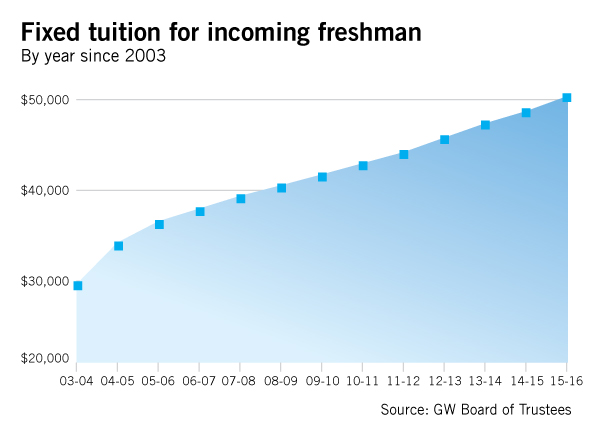The Board of Trustees approved a 3.4 percent tuition hike for next fall’s incoming freshman class with a twist: A portion of the about $4 million increase will go toward boosting mental health resources on campus.
That increase, which marks the first time tuition has crossed the $50,000 threshold, locks in the annual cost of tuition at $50,367 for the Class of 2019. It also follows Dean of Student Affairs Peter Konwerski’s speech to the trustees on Friday calling for shorter wait times for appointments and hiring more specialists to work with niche populations.
Students have complained for years of long wait times and too few counselors to meet demand in the University Counseling Center. The added funds could help strengthen an office that Konwerski said has seen individual appointments, psychiatry appointments and after-hours crisis incidents rise over the last year.
A portion of the tuition increase will be put toward hiring the “equivalent of just over eight” positions, including counselors, a case manager and psychiatrists, University spokeswoman Candace Smith said. She declined to provide a total cost estimate or say how much of the increase would go toward hiring.
“Additional funding will support programming and training,” Smith said.
The board also approved a 3.5 percent cost of attendance increase for incoming freshmen, raising the price of tuition, fees and room and board to $62,285. That marks the eighth-straight year of about 3 percent sticker price increases, and the second year in a row that GW’s total cost of attendance has topped $60,000.
Konwerski said new staffers could work with multicultural or LGBT students. Earlier this fall, GW hired several new counselors, including one who works with veterans and another with multicultural and international students. Konwerski also pinpointed a need to “have a presence in” the law school and the larger graduate student population.
[RLBox]
[RL articlelink=”https://www.gwhatchet.com/2014/04/05/after-tragedies-campus-begins-healing-process/”]
[RL articlelink=”https://www.gwhatchet.com/2014/11/17/eager-second-year-law-student-remembered-for-sincerity-empathy/”]
[RL articlelink=”https://www.gwhatchet.com/2014/12/04/fourth-year-law-student-remembered-for-easy-going-personality-sharp-wit/”]
[/RLBox]
Two law students were found dead in their off-campus apartments last semester, and the D.C. chief medical examiner’s office has not yet released a cause of death for either case. Last spring, three students committed suicide in their residence hall on the Mount Vernon Campus, and a student attempted to commit suicide on Foggy Bottom in the fall.
“We, as a University, have to be prepared to respond,” Konwerski said at the meeting.
Experts say marketing the tuition increase as a way to improve mental health resources is a savvy move that could make it more palatable for incoming students.
Richard Vedder, the director of the Center for College Affordability and Productivity, said associating more resources for mental health with the increase shows officials are trying to “put a good face on.”
“But GW is awfully darn expensive,” Vedder said. “My feeling is that’s just PR.”
Nicholas Hillman, a higher education policy professor at the University of Wisconsin-Madison who specializes in financial aid, said billing the tuition increases as a way to focus on campus mental health could also help connect the community to the issue.
“You have some sort of communal problem to solve, which is in this case suicides. How can the University be more preventative, inclusive and aware?” Hillman said. “Maybe the Board of Trustees was thinking this is a way to try and help solve a problem. They’re looking for places to find resources, and tuition is one of many places to find resources.”
Officials have focused on campus mental health for the past several years, waiving fees for the first six sessions at the University Counseling Center and hiring more clinicians. The topic has also been a key goal of Student Association leaders, who advocated for the move of the University Counseling Center and Student Health Service to campus.
The funding boost follows three years of increases to UCC’s budget. This year, UCC was one of three departments to series a funding increase after a series of University-wide budget cuts.
In 2013, GW gave the center an additional $150,000 to cover the costs of hiring two additional counselors, and the year before, it increased the counseling budget by $40,000 to help shoulder the costs of free sessions.
Konwerski said supporting students must remain a top priority, despite tight budgets.
“That’s our goal, that we’ll continue to build a case,” Konwerski said in an interview.
The University has also tried to balance sticker price hikes with increases to the financial aid pool, which has doubled in size over the last decade. Trustees voted to grow that pool by $6 million last spring, which was about on pace with the tuition increase. The pool shrunk by $2 million the previous year.
Robert Kelchen, an assistant higher education professor at Seton Hall University, said putting the tuition increase toward mental health resources may be more of a messaging move as colleges have come under fire for rising costs.
“It’s definitely good from a messaging standpoint,” Kelchen said. “It’s difficult to message that even though cost of attendance is $62,000 that it might be affordable.”
Mary Ellen McIntire contributed reporting.







